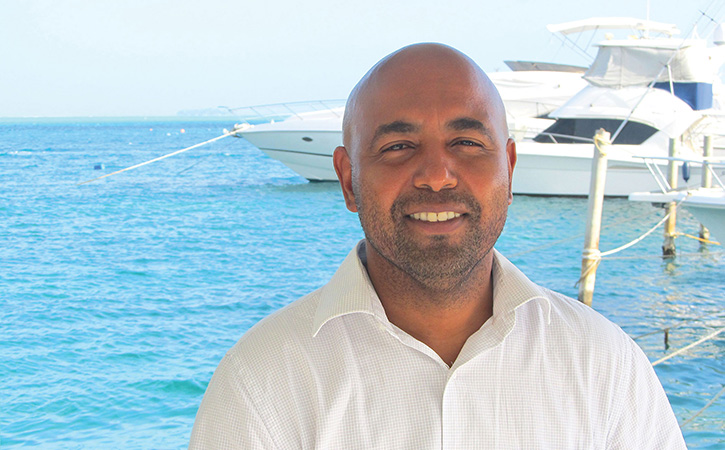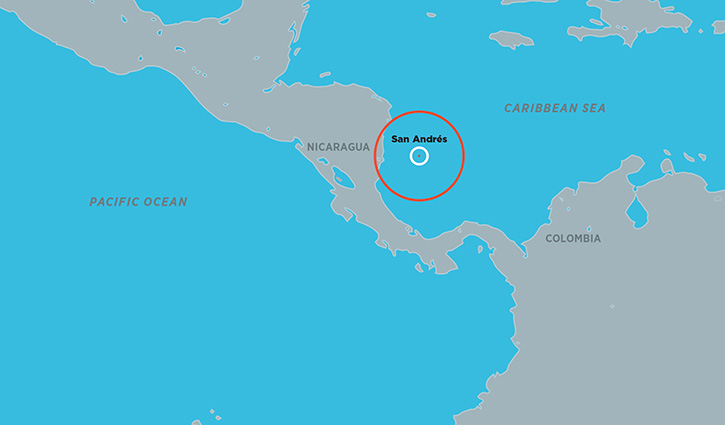Tiny island, big issues
Alumnus works to solve territorial dilemma in Caribbean tropics

One day on the sun-drenched island of San Andrés, Colombia, Richard Francis, MPA ’12, approached a woman selling cold soda and beer at a kiosk next to the beach. The woman was hauling sacks of ice with a wheelbarrow and throwing them over the bottles and cans, which sat inside a rusty tank. At the time, Francis was director of the island’s Banking for Opportunities program that provided micro-loans to business owners who could not normally get a bank loan. He proposed a microloan to the woman, and she accepted. When the woman saw that she had a bank account with the money to buy a refrigerator, she was ecstatic.
“A week after I went to visit her, and it was very gratifying to see her with her fridge full of cold drinks and the business moving,” Francis says.
San Andrés is a place of “dazzling natural beauty and enchanting landscapes,” says Francis. The prosperity of the island and its people has been of paramount importance to him for over a decade. He has worked in public service since 2005, filling several high-level positions, including Secretary of Tourism from June 2016 through January 2017.
Working on a tiny, tropical island (San Andrés is 17 square miles total) might seem like paradise, right? The tranquility, the boats, the Ron Medellin rum — they’re nice, but Francis has important work to do.
“Surely not everything is heavenly. To be honest, every day that passes, my paradise fades quickly,” he says.
The most important work of his life
San Andrés is part of an archipelago, or chain of islands, whose economy is largely dependent on tourism and fishing. However, the indigenous population of San Andrés can no longer access its traditional fishing banks because of a 2012 determination by the International Court of Justice that the fishing banks now belong to nearby Nicaragua.
“This fact represents a major governance and public-policy problem, especially taking into account that you are talking about islands with few kilometers of dry land and a high dependence on the resources obtained from fishing,” Francis says.
Francis is currently in San Andrés, serving on an advisory team for the president of Colombia, Juan Manuel Santos. The team’s objective is to develop a policy framework (with a national and binational perspective) that will encourage Colombia and Nicaragua to create a “Special Border Integration Zone” between both countries’ border regions in the Western Caribbean Sea.
The border integration zone aims to create a single territory where both countries’ native artisanal fishermen can fish. It’s Francis’ role to advise on issues of international relations and public affairs.
“The most important work of my life is what I am doing now. In my hands (and the rest of the team) is the task of creating alternatives to solve the problem generated by the court’s ruling. The creation of a Special Border Integration Zone with Nicaragua is an alternative that will not only to solve the fishing problem, but will also help deal with other fundamental problems,” Francis says.
The issue is complicated. The team must seriously consider the contemporary global issues affecting maritime border regions that may undermine the feasibility of a reunification, says Francis of the more than 80-year ancestral territorial dispute between Columbia and Nicaragua. These include security issues, illegal trafficking and fishing, poverty and transnational environmental threats.
“Undoubtedly, now (more than ever) is when I will have to put to the test everything I’ve learned in Binghamton. The daily bread will be to overcome obstacles of a political, economic and, sometimes, social nature. I say this because I have already learned that alternatives that involve changes have a rather rocky and discouraging path, and the duty is to overcome it ... But that’s exactly what my training in Binghamton was all about!”
No ceilings
Can Francis handle this massive endeavor? Associate Professor of Public Administration Nadia Rubaii, who was his master’s capstone advisor, saw Francis as open and receptive to learning from others, a skill that she believes likely serves him well in his current position.
“Francis knows this kind of work cannot be treated like business as usual,” Rubaii says. “He took a comparative approach to addressing issues in the classroom, learning from other communities and other countries to help solve problems.”
Francis said that his time at Binghamton expanded his understanding of global issues and illuminated his abilities to advance positive change.
“Looking back and analyzing how my life has been since I returned from Binghamton, I can only say that it was a dizzying ascension, thanks to the skills I learned during my training in my master’s program. The knowledge and experience gained with the MPA gave me confidence in myself. I felt that there were no ceilings, only the ones I put on top of me.”

